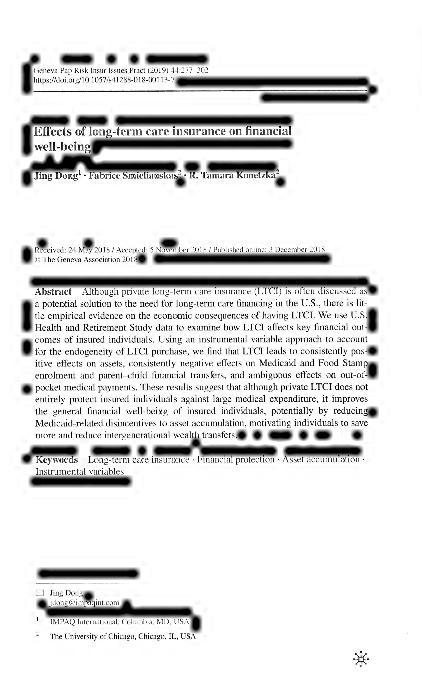Effects of long-term care insurance on financial well-being

Contenido multimedia no disponible por derechos de autor o por acceso restringido. Contacte con la institución para más información.
| Tag | 1 | 2 | Valor |
|---|---|---|---|
| LDR | 00000cab a2200000 4500 | ||
| 001 | MAP20190012461 | ||
| 003 | MAP | ||
| 005 | 20190507164232.0 | ||
| 008 | 190507e20190401esp|||p |0|||b|spa d | ||
| 040 | $aMAP$bspa$dMAP | ||
| 084 | $a34 | ||
| 100 | 1 | $0MAPA20190005494$aDong, Jing | |
| 245 | 1 | 0 | $aEffects of long-term care insurance on financial well-being$cJing Dong |
| 520 | $aAlthough private long-term care insurance (LTCI) is often discussed as a potential solution to the need for long-term care financing in the U.S., there is little empirical evidence on the economic consequences of having LTCI. We use U.S. Health and Retirement Study data to examine how LTCI affects key financial outcomes of insured individuals. Using an instrumental variable approach to account for the endogeneity of LTCI purchase, we find that LTCI leads to consistently positive effects on assets, consistently negative effects on Medicaid and Food Stamp enrolment and parentchild financial transfers, and ambiguous effects on out-of-pocket medical payments. These results suggest that although private LTCI does not entirely protect insured individuals against large medical expenditure, it improves the general financial well-being of insured individuals, potentially by reducing Medicaid-related disincentives to asset accumulation, motivating individuals to save more and reduce intergenerational wealth transfers. | ||
| 650 | 4 | $0MAPA20080603786$aSeguro de dependencia | |
| 650 | 4 | $0MAPA20080587901$aSeguro de personas | |
| 650 | 4 | $0MAPA20080598518$aProtección sanitaria | |
| 651 | 1 | $0MAPA20080638337$aEstados Unidos | |
| 773 | 0 | $wMAP20077100215$tGeneva papers on risk and insurance : issues and practice$dGeneva : The Geneva Association, 1976-$x1018-5895$g01/04/2019 Volumen 44 Número 2 - abril 2019 , p. 277-302 |

